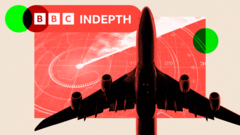The threat of GPS jamming has escalated, most notably highlighted by a recent incident where a Ryanair flight was forced to abort its landing due to unexpected GPS signal interference. This is part of a troubling trend, with over 800 cases of signal disruption recorded in Lithuanian airspace in just a few months, raising international concerns, particularly among NATO allies. As reliance on GPS grows, so does the potential for widespread disruption across vital systems, from finance to communications.
In response to this pressing challenge, the UK government has mobilized a team of researchers, affectionately dubbed the "Time Lords," to devise solutions that circumvent the vulnerabilities of current satellite navigation systems. Their ambitious goal involves developing cutting-edge atomic clocks that are secure, portable, and more reliable than traditional GPS technology, which is susceptible to jamming. These new systems could offer not only a backup to existing GPS technology but also revolutionize how we measure time itself.
The potential economic impact of GPS disruption is staggering, with estimates suggesting losses could reach £1.4 billion each day. With such high stakes, the research into quantum technologies is gaining momentum, aiming to create a more reliable navigation system within the next few years. The vision is to miniaturize these powerful atomic clocks to the point that they can be integrated into everyday technology, such as smartphones, providing individuals with personal navigation systems immune to interference.
Historically, advancements in timekeeping have paved the way for transformative changes in navigation and global communication. By striving to create portable optical clocks, researchers aim to redefine accuracy and usability in navigation technology. Dr. Helen Margolis and her team at the National Physical Laboratory are leading this charge, while collaborating with experts in quantum technologies to pioneer a revolution that could change communication, transportation, and security over the next decade.
The journey of developing these systems is not without its challenges, reminiscent of John Harrison's 18th-century quest for a marine chronometer. Scientists today are grappling with similar obstacles in crafting devices that maintain accuracy across various environmental conditions. However, advancements in quantum mechanics show promise, offering a pathway to future systems that provide accurate, tamper-proof navigation.
As the threat of GPS jamming continues to mount, the urgency of these developments cannot be overstated. The "Time Lords" aim not only to safeguard the UK's crucial infrastructure but also to ensure that potential alternatives to GPS are readily available, preparing society for any unforeseen disruptions in satellite-based navigation. The quest for more secure temporal measurement awaits, with implications that stretch far beyond modern navigation, holding the key to both current infrastructure and future technological advancements.






















